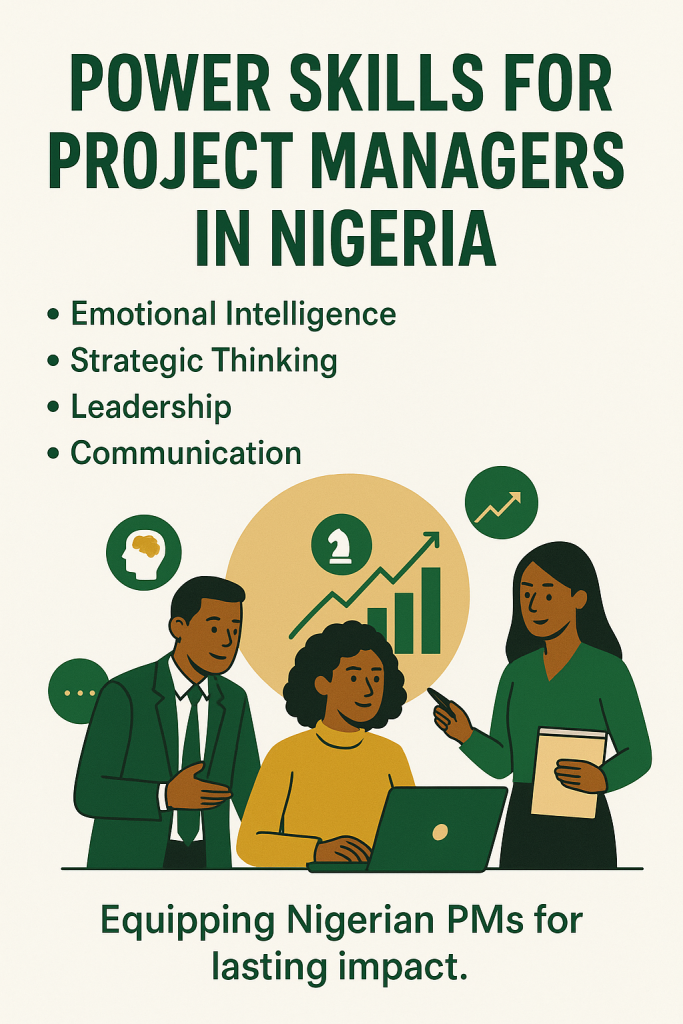Being a project manager is no longer about ticking boxes, monitoring timelines, or managing budgets alone. Organizations in Nigeria and globally are looking for professionals who bring more to the table than technical knowledge.
They want project managers with power skills: emotional intelligence, strategic thinking, leadership, and communication. These skills go beyond hard certifications like PMP, Agile, or Scrum Master; they are the capabilities that enable you to lead teams, build trust, influence stakeholders, and deliver results in dynamic environments.
In this post, we’ll explore why these power skills are becoming essential for project managers in Nigeria, how they impact career growth, and how you can develop them to stay ahead.
Why Power Skills Matter in Project Management
Technical expertise is important, but it’s no longer enough. Nigeria’s business environment is competitive and unpredictable. Whether in fintech, telecoms, oil and gas, or tech startups, projects are often complex, fast-paced, and people-driven.
A certified project manager may understand Gantt charts, Agile ceremonies, or Lean principles—but without the soft power to lead people, align stakeholders, and communicate effectively, projects often stall.
This is why companies like Dangote, MTN, Access Bank, and Andela now place strong emphasis on interpersonal and strategic capabilities when hiring or promoting project managers.
As one HR director put it: “We can teach someone how to use a project management tool, but teaching them how to lead with empathy and influence stakeholders is much harder.”
Emotional Intelligence (EQ): The Foundation of Leadership
Emotional Intelligence is the ability to understand, manage, and influence emotions—both your own and others’. For project managers in Nigeria, where teams are diverse and stakeholder expectations are high, EQ is critical.
With strong EQ, you can:
Resolve conflicts without escalating tension.
Motivate and inspire your team even under pressure.
Build trust with clients and stakeholders.
Adapt to cultural and organizational nuances.
Imagine handling a high-stake project in Lagos with a multinational client. Deadlines are tight, pressure is high, and team members are stressed. A project manager who can stay calm, show empathy, and guide the team with confidence will stand out as a leader.
Strategic Thinking: Seeing Beyond the Task List
A project manager who only focuses on daily tasks risks being seen as “just an administrator.” Strategic thinking is what elevates you into a leader who contributes to the bigger picture.
Strategic project managers:
Align projects with business objectives.
Anticipate risks and opportunities before they happen.
Make data-driven decisions that improve outcomes.
Identify how a project impacts revenue, reputation, or growth.
For instance, in Nigeria’s growing tech ecosystem, a strategic project manager will not only deliver an app on time but also think about user adoption, scalability, and business value helping the company gain a competitive edge.
Leadership: Inspiring and Guiding Teams
Leadership in project management is not about authority it’s about influence. Nigerian workplaces are often hierarchical, but modern organizations are realizing that the best project managers are those who inspire, not command.
Leadership power skills include:
Delegating effectively while holding accountability.
Creating an environment of psychological safety where team members share ideas freely.
Inspiring confidence and commitment from your team.
Leading by example especially under challenging conditions.
True leadership is what transforms a group of individuals into a high-performing team capable of delivering projects that exceed expectations.
Communication: The Glue That Holds It All Together
Project managers spend over 70% of their time communicating—through emails, meetings, reports, and presentations. In Nigeria’s multicultural and multi-industry context, poor communication is often the root cause of failed projects.
Great communication skills enable you to:
Translate complex information into simple, actionable messages.
Manage stakeholder expectations by being clear and transparent.
Navigate cross-functional teams where not everyone speaks the same “technical language.”
Ensure alignment across local and international teams.
Think of it this way: even the best strategy or timeline can collapse if communication breaks down.
Building Your Power Skills as a Nigerian Project Manager
The good news is that these power skills can be learned and strengthened. At ScrumConsult, we train professionals not only in globally recognized certifications (PMP, Scrum Master, Agile, Lean Six Sigma) but also in the soft skills that employers demand today.
Our programs are designed to help you:
Gain technical certifications and practical frameworks.
Master communication, leadership, and EQ through real-life simulations.
Transition smoothly into project management roles with confidence.
Position yourself for higher salaries and leadership opportunities.
Conclusion: The Future Belongs to Project Managers with Power Skills
In Nigeria’s rapidly evolving job market, project managers who combine technical knowledge with emotional intelligence, strategic thinking, leadership, and communication will always be in demand.
Technical skills get you noticed. Power skills get you promoted.
Are you ready to sharpen your edge and stay relevant?
👉 Ready to take your skills to the next level?
Enroll today and transform your career with ScrumConsult’s professional training programs.
From Scrum Master Certification in Lagos to Agile Expert, Project Management, Business Analysis, Lean Six-Sigma Green & Black Belt, SMC, PSM, and CSM, we provide the tools and knowledge you need to thrive in a competitive, data-driven world.
📌 Visit scrumconsult.com
today to get started.

